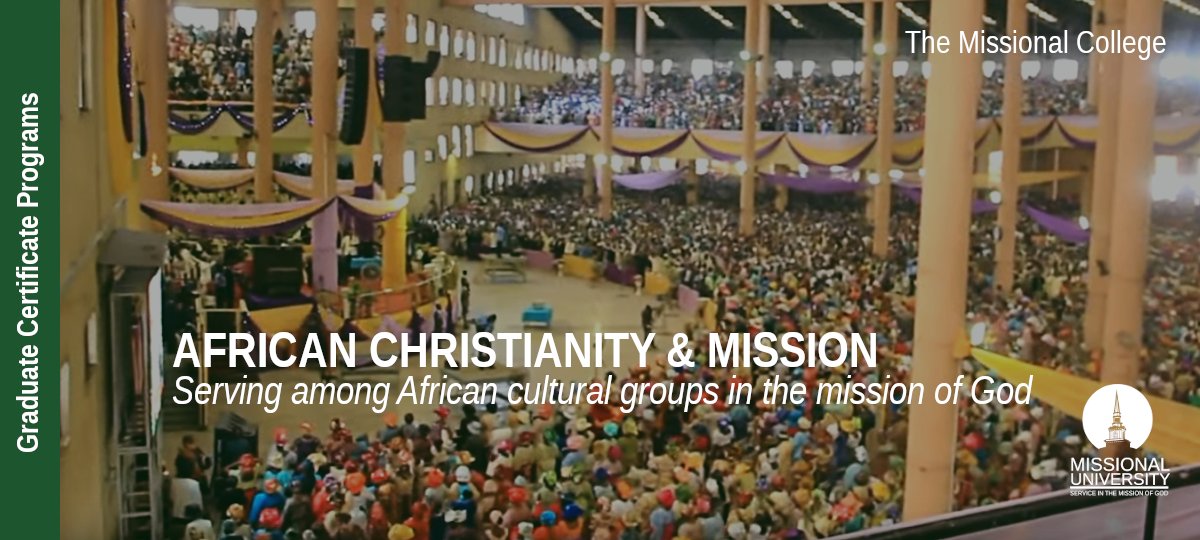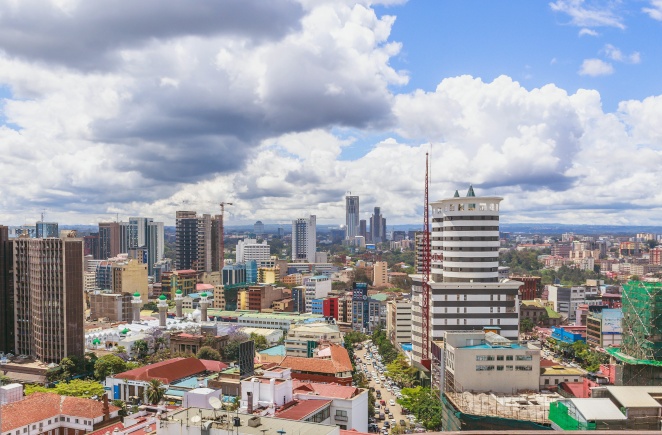
Online Graduate Certificate Program in
African Christianity & Mission
School: Missional College // Study Area: Serving Among Cultural Groups
☀ Totally Unique Program = only available at Missional University
Expand Your Intercultural Abilities Today!
REQUEST INFORMATION
Ready to learn more about the
Graduate Certificate in
African Christianity & Mission?
LEARN MORE NOW
The Graduate Certificate in African Christianity & Mission offers students an understanding of the history and growth of Christianity in Africa from antiquity to the present in areas that include: Christianity's relation to African political and social systems, the African roots of Christianity, African perspectives on biblical interpretation and theology, and African views of the relation between the gospel and African social issues. Through the certificate program, students gain the following abilities:
-
- ability to develop a biblical and theological understanding of race and ethnicity and engage contemporary issues of racism, immigration, justice, and the refugee crisis on the African continent.
- ability to assess important African personalities, theological works, and contemporary theological issues that shape the responsiblity, problems and opportunities that African theologians face.
- ability to interpret theological understandings of the past, provide a missiological analysis of the present, and set a path forward for African Christianity in light of the signficant social, polictical and theological issues of the 21st century
- ability to articulate the African roots of Christianity and their contribution to global Christianity from the early centuries.
- ability to articulate the unique theological and missional contributions that African Christianity makes to the global Christianity community.
- ability to investigate African contextual theology and missional practice and their impact on issues such as polygamy, apartheid, social unrest, poverty, urbanization, etc. in Africa and beyond.
According to the Center for the Study of Global Christianity at Gordon-Conwell Theological Seminary, Africa is critical for the future of global Christianity because in the next 10 years, Africa will likely grow to have the most Christians of any continent: 700 million. The United Nations Children’s Fund (UNICEF) projects that by the year 2050, the population of Africa under age 18 could be greater than 1 billion. Most of them will identify as Muslim or Christian. Both Christians from other countries who serve in Africa as well as Christian leaders within Africa need a clear understanding of the current state of African Christianity in relation to 21st century challenges and an understanding of the missional task going forward. The Graduate Certificate in African Christianity & Mission provides a framework for Christian leaders to make serious missional contributions to the future of the African continent.
Program Features
-
Integrated practicums allow you to gain valuable real-world experience
-
Learn from academic practitioners from around the world
-
Credits earned in this certificate program can apply to a Missional University Master's degree program
Course Effort
Course Length
Credits Required
Program Cost
What Will I Study?
We offer the most comprehensive approach to serving among cultural groups in the mission of God.
Analyzes the Biblical understanding of human nature related to race and ethnicity. The student will explore various philosophical and historical perspectives, biblically respond to these, and develop ministerial and missional strategies for engaging issues such as racism, immigration, justice, and the refugee crisis.
Compares the important personalities, theological works, and issues defining the study of Christian theologies in modern Africa. Cultural/theological impacts of pre-modern, modern, and postmodern issues on contemporary African Christian theologies will be analyzed. The student will understand and engage the shift of Christianity from its Western “homeland” to Africa, and the responsibility, problems and opportunities these shifts pose for biblical Christianity in Africa.
To give a meaningful and purposeful existence to its adherents and to have public prophetic voice, African Christianity needs to make deep and significant contribution in interpreting the past, analyzing the present, and setting a path for the future. The impact of the slave trade and colonialism is still haunting Africans after many generations. The global financial system, the presence of China in Africa, the corruption in African leadership, the higher level of unemployment, and the challenge of radical Islam, begs for theological and missiological analysis. For many Africans, the future is dark. This course provides theological understanding of the past, and missiological analysis of the present and the future.
In literature and art, up until recent time, Africans hardly depicted as major contributors to Western Christian theology and pedagogy. The world, particularly the Western Christians are clueless that before the first convert of Anglo-Saxon, Christianity had ten generation in some part of Africa. Among other things, this course presents how the Western idea of university is born in the crucible of Africa, how exegesis of the scripture and Christian dogma matured in African continent, how Christian Neoplatonism emerge in Africa, and how rhetorical and dialectical skills are honed in Africa and how all these ideas were transplanted to the Western Christendom.
Despite the perceived declining of Christianity in the West, Christianity in Africa is growing rapidly. With an increase of 4,000% in the last century, and an annual growth of 2.5%, Africa is one of the fastest growing Christian continents in the world today. Despite the social unrest, poverty, external and internal exploitation and injustice Africans go through; it is undeniable that a strong sense of the Divine pervades the ordinary lives of the peoples of Africa. African converts primarily became Christians instead of church members. Africans have recognized the radical quality of God’s self-disclosure in Jesus Christ and they understand the God of the Bible within their own idioms and cultural accoutrements. This course explores the insinuation of the current Christian growth in Africa on the various challenges the continent face and the implication of growth on global Christianity.
Since the modern Western mission in the continent, African Christianity has been struggling to find its own identity to imbed in African culture, to be the faith of Africans that pervade their mind and soul and speak to their daily life in every context. Because of the unhealthy marriage of mission and colonialism, by many Africans, at the beginning of Western mission, Christ was perceived as uninvited guest. This course examines the progress of African Christianity and its potential impact in global mission.
Optional Additional Courses:
Exploration the differences between "folk" and "world" religions. Anthropological methods for understanding folk practices on their own terms and in relationship to other practices/perspectives is also covered.
Introduction to folk art; its nature, scope and characteristic visual forms and styles. Students learn to study a range of utilitarian and decorative media, including cloth, wood, paper, clay, metal, etc. that convey a community's authentic cultural identity, rather than an individual or idiosyncratic artistic identity.
This course is an advanced course designed to give students an in-depth understanding of natural resources in the African continent. Detailed cases students of selected countries will be done by students to establish the root causes of the present paradox experienced by the African continent, whereby the continent has some of the largest deposits of natural resources yet has some of the poorest countries. Cases studies will place special emphasis on an understanding of the natural resources in the African continent and the environmental socio-economic, and political impact of the exploration and exploitation of these resources.
To give a meaningful and purposeful existence to its adherents and to have public prophetic voice, African Christianity needs to make deep and significant contribution in interpreting the past, analyzing the present, and setting a path for the future. The impact of the slave trade and colonialism is still haunting Africans after many generations. The global financial system, the presence of China in Africa, the corruption in African leadership, the higher level of unemployment, and the challenge of radical Islam, begs for theological and missiological analysis. For many Africans, the future is dark. This course provides theological understanding of the past, and missiological analysis of the present and the future.
For centuries, Africa has been dubbed a Dark Continent: underdeveloped, backward, and impoverished. The Western media footage of Africa is people stricken with hunger, malnourished children with extended bellies, and piles of corpses, all the result of famine or civil war, and destitute refugees. Our eyes are familiar with Africans who are suffering because of HIV or Ebola, without medical care and hospital beds lying on a dirt floor in their mud huts. Beyond this surface level of understanding, the majority of the world particularly the West has no clue about the wealth of Africa that made unparalleled contribution to Western capitalism. This course underscores the natural resources of Africa that caused colonialism and currently brought the huge presence of Chinese and the involvement of China in many affairs of the African nations.
An examination of public health issues among African & Black Diaspora in light of health belief model studies and the impact of those cultural beliefs upon their willingness to seek medical care. Students will evaluate strategies for community health promotion among African & Black migrants that address the issues health beliefs bring to bear upon medical care.
When Can I Get Started?
We offer multiple start dates each year to give you flexibility in your education, life and work schedules.
JANUARY
MARCH
MAY
AUGUST
OCTOBER
A Career in Navigating Cultural Difference
Is this Your Mission?
Missionary, Church Planter, Community Ministry Practitioner, Immigration Services Coordinator, Community Worker, International Worker, Humanitarian Worker, Missional Team Leader, Global Director, Faith and Development Manager, Marketplace Ministry Worker, Children's and Youth Worker, Researcher
Request Information Now
How Much Will it Cost?
We offer tuition based upon country of residence. According to the Human Development Index, all countries around the world fall into one of four categories:
-
(Tier 1) - Very High Human Development
-
(Tier 2) High Human Development
-
(Tier 3) Medium Human Development
-
(Tier 4) Low Human Development
Our tiered global tuition makes higher education affordable for everyone world wide.

TIER COUNTRIES
100% Tuition
$395
per credit hour
3 credit course
$1185

TIER COUNTRIES
80% Tuition
$316
per credit hour
3 credit course
$948

TIER COUNTRIES
60% Tuition
$237
per credit hour
3 credit course
$711

TIER COUNTRIES
40% Tuition
$158
per credit hour
3 credit course
$474
Tiered tuition based on country of origin and scholarships available. Find your country of residence here for more information.
Tuition may be further reduced by participating in the Sponsorship Program.
